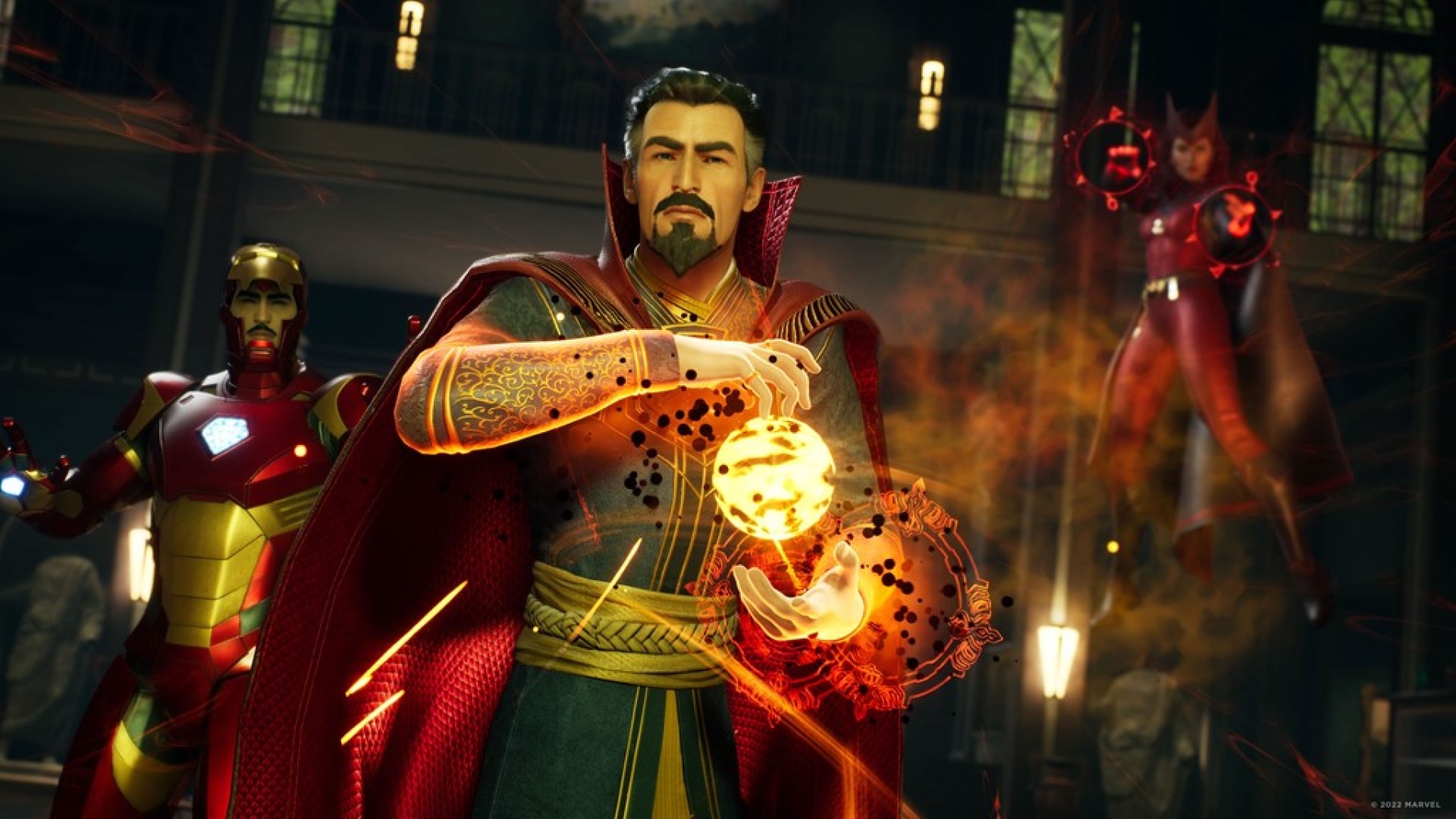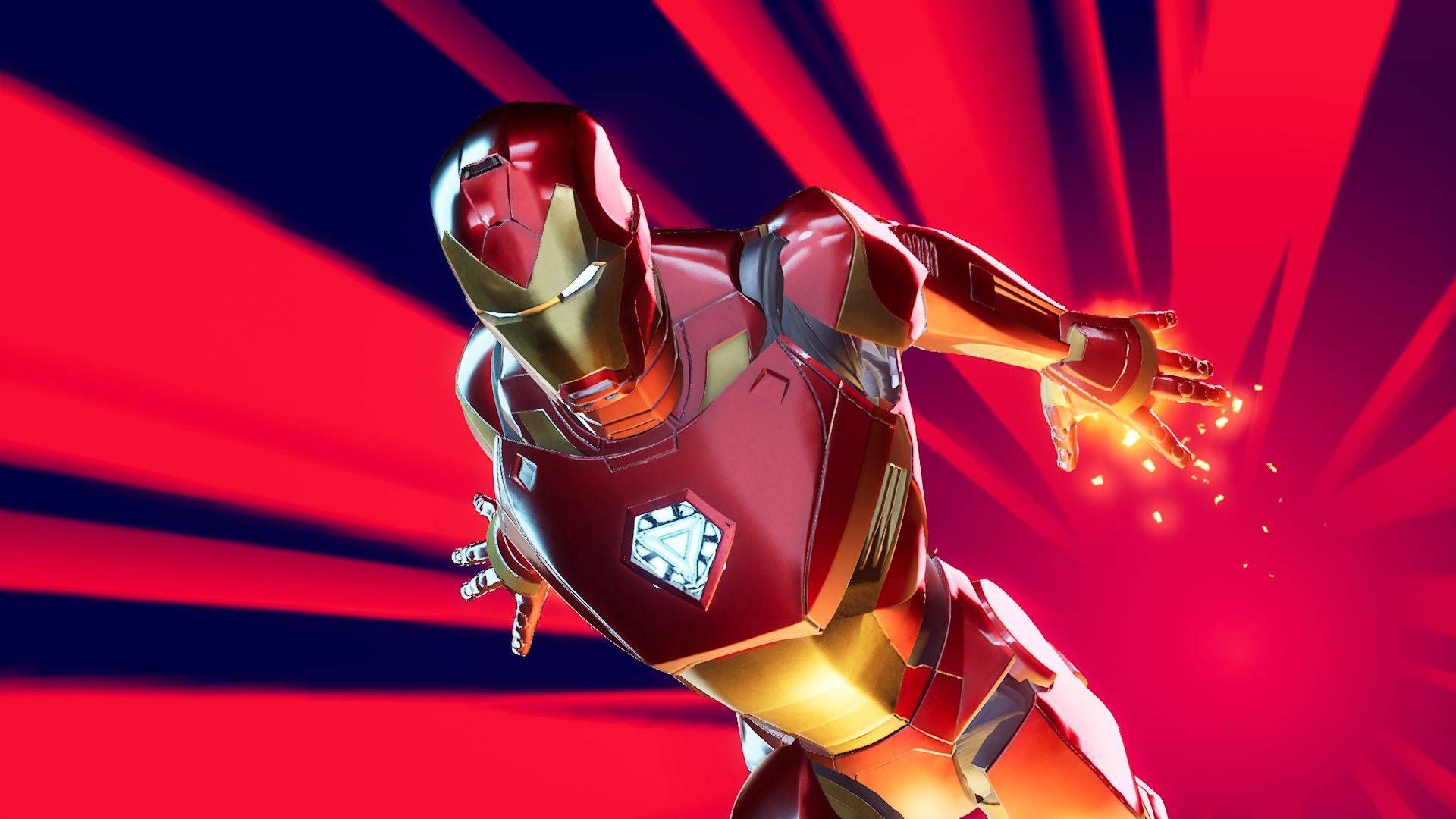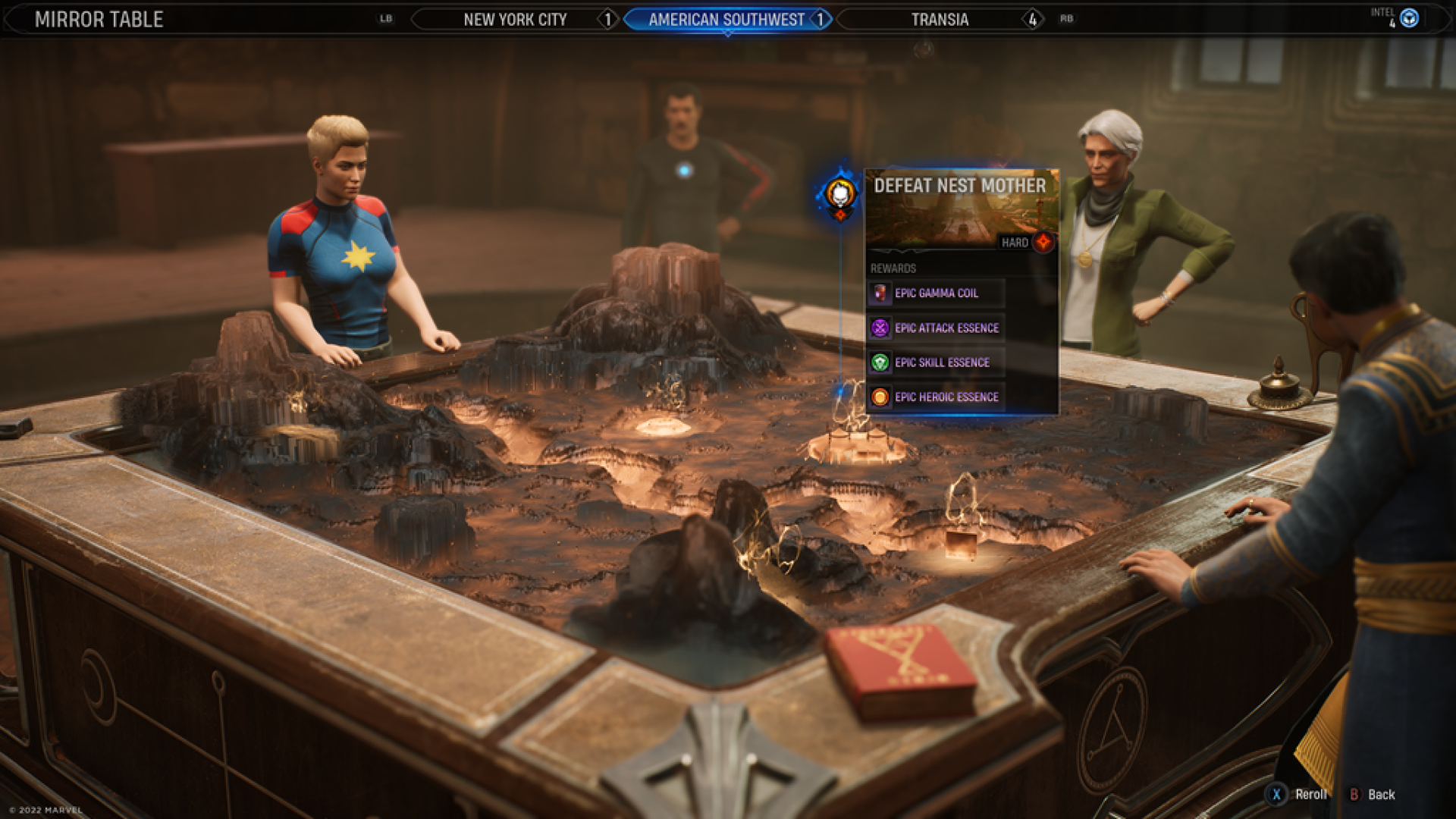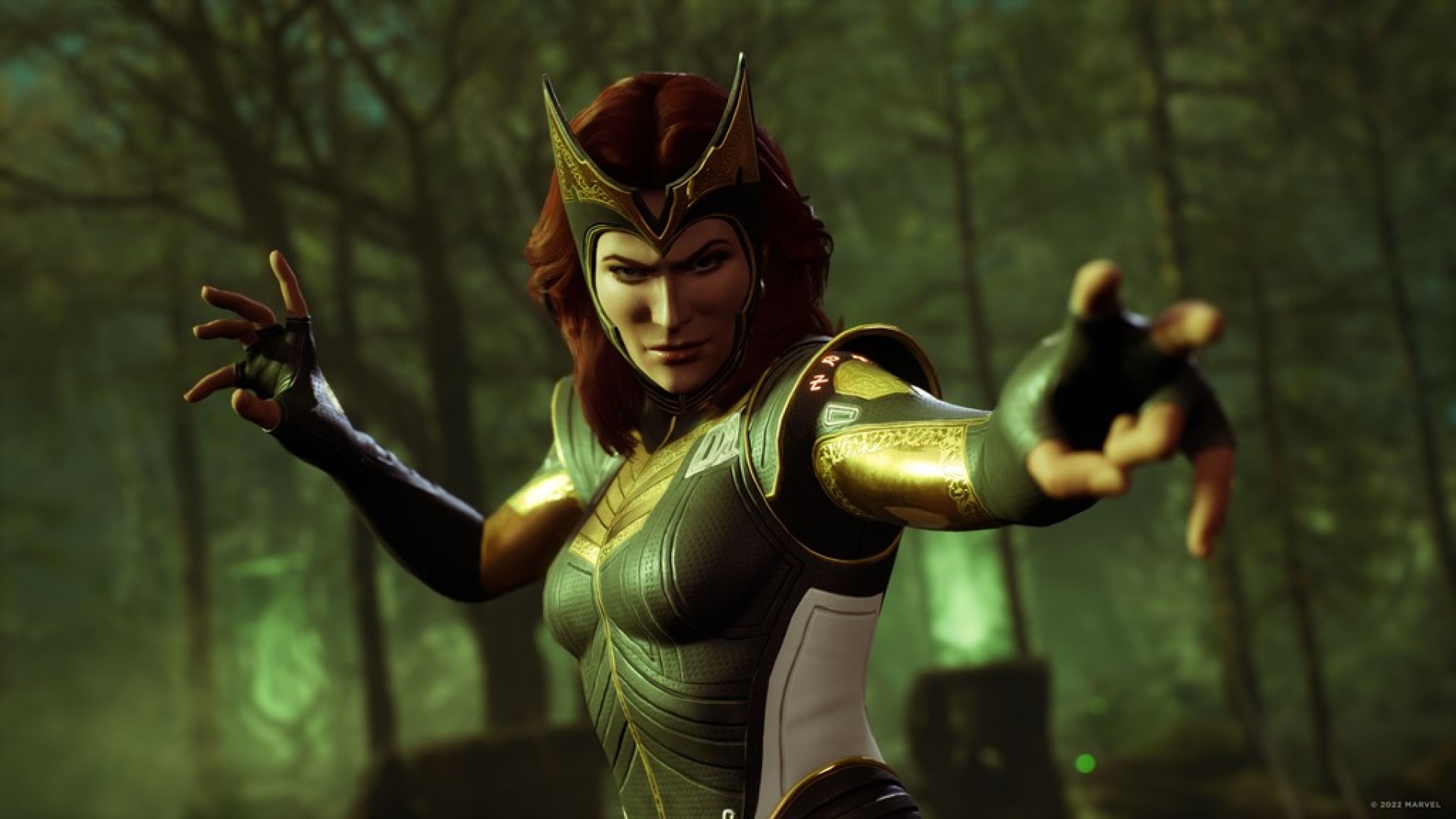Marvel's Midnight Suns made me like superheroes again
Throw away your mask

Tony Stark is cooking me dinner. Up until very recently, the idea of suffering through a meal with this particular egotistical, over-monied tech bro would have seemed like a threat, but I find I’m actually looking forward to it. We’re sat together at a bar in the bizarre, foreboding abbey where Midnight Suns’ heroes are based. In the shadow of the gothic arches of this place, the genius, billionaire, playboy, philanthropist seems rather small.
As we talk, he boasts about what he’s cooking – his grandmother’s famous curry, with some Tony Stark alterations, of course. I ask what these are. He says he’s cut out the vodka. With surprising nonchalance, he talks about the supplies he’s brought in for the “dry bar”. He doesn’t speak further about his struggles with alcoholism, but the nugget of detail does more to humanize this iconic figure than almost every Marvel movie.
It hits me that I’m dealing with an entirely different take on Tony Stark. By plucking Iron Man from the Marvel Cinematic Universe, Firaxis has bought a level of granular authenticity into the character. After years of Marvel fatigue, I would have been happy never to see Stark’s smug face again – or so I thought. Firaxis’ superhero strategy game and friendship simulator has changed my mind in a way that I did not see coming.

The Hunter, whom you customize at the game’s start, is your lens into Firaxis’ reframing of the well-established Marvel fiction. Reminiscent of Fire Emblem: Three Houses, I Was a Teenage Exocolonist, and – most notably – Persona 5, Marvel’s Midnight Suns places as much emphasis on the protagonist’s social life as it does their time battling the forces of evil as a spandex-clad do-gooder. After every mission, you select a fellow hero to spend your evening with, building your figurative and literal friendship level through dialogue and shared experiences.
As you spend more time with this homicidally brave band of idiosyncratic heroes, you come to care for your new messy, adopted family.
As you spend more time with this homicidally brave band of idiosyncratic heroes, you come to care for your new messy, adopted family. By interacting with the other heroes through meaningful (though rarely reality-altering) dialogue choices, you can peel back the layers of these characters like a melodramatic onion. It seems 2022 was the year developers finally realised they should take a leaf from Persona’s book, and I am here for it.
Battle bonds

Sign up for breaking news, reviews, opinion, top tech deals, and more.
By giving you a chance to see your heroes as fully fleshed-out human beings, Midnight Suns has already done the work. It’s the oldest trick in the book: the more you come to care for these characters, the less you want to see them get hurt.
Though initially grating, I soon warmed to Nico, an independent young witch and wielder of terrifying eldrich powers. Before long, I came to see her as something of a surrogate sister to my character. This is why I wince whenever she gets knocked out by Hydra goon. I know she’ll be back and ready to fight in a couple of days, but my brain has already been tricked into caring about the person-shaped mass of pixels on my screen.
Wolverine may be great in a fight, but I’d rather take Doctor Strange because I trust him and enjoy his slightly more genteel banter in combat.
Strategy games can often seem to be about cold calculation, but Firaxis has injected Marvel’s Midnight Suns with warm feelings and friendships. The effective execution of the conversation-based friendship-simulator aspect of Midnight Suns ensures that emotional investment twists what might otherwise be cold, strategic judgment. Consider the hero selection process before a mission: Wolverine may be great in a fight, but I’d rather take Doctor Strange because I trust him and enjoy his slightly more genteel banter in combat.
Earth's mightiest heroes

Firaxis doubles down on both the mythological and personal aspects of Midnight Suns’ characters. By departing from the canon of the Marvel films and choosing its own direction, Firaxis takes full advantage of its agency as a storyteller. It is surprisingly liberating to see the likes of Spider-Man and Captain Marvel unencumbered by the narrative baggage of Disney’s bloated cinematic universe.
It is surprisingly liberating to see the likes of Spider-Man and Captain Marvel unencumbered by the narrative baggage of Disney’s bloated cinematic universe.
It’s no coincidence that we saw similar success with Eidos-Montreal’s Guardians of the Galaxy game. I expected a milquetoast third-person shooter, but I got a compelling and soulful action game where mechanics and narrative meshed wonderfully to deliver a fulfilling tale of found family. Plus, the title offered a version of Star-Lord far removed from Chris Pratt’s snarky manchild, which was a definite plus.
It’s clear that, in the right hands, great games can be crafted with the Marvel ensemble. And, after all these years, it’s not that I’d grown tired of superheroes; I was looking for courageous storytelling.

An editor and freelance journalist, Cat Bussell has been writing about video games for more than four years and, frankly, she’s developed a taste for it. As seen on TechRadar, Technopedia, The Gamer, Wargamer, and SUPERJUMP, Cat’s reviews, features, and guides are lovingly curated for your reading pleasure.
A Cambridge graduate, recovering bartender, and Cloud Strife enjoyer, Cat’s foremost mission is to bring you the best coverage she can, whether that’s through helpful guides, even-handed reviews, or thought-provoking features. She’s interviewed indie darlings, triple-A greats, and legendary voice actors, all to help you get closer to the action. When she’s not writing, Cat can be found sticking her neck into a fresh RPG or running yet another Dungeons & Dragons game.